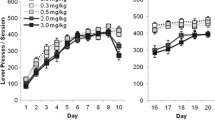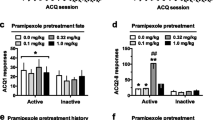Abstract
Rationale: Several benzodiazepines (BZs) have been shown to increase the peak force of operant responses at doses that increased, decreased, or had no effect on response rate, suggesting that operant response force may be a sensitive index of BZs’ effects rather than solely a correlate of rate-dependent effects. In addition, contingent tolerance to the rate-dependent effects of BZs has been reported, but the degree of contingent tolerance that develops when the critical variable of the task is force of the response has not been explored. Objectives: These experiments examined the effects of acute and repeated oral administration of diazepam (DZ) and midazolam (MZ) on a force-differentiation task to explore the importance of task requirements on the development of contingent tolerance. Methods: Two groups of rats were trained to press a force-sensing operandum, and responses having peak forces falling within fixed lower and upper limits [low force (8–10 g) or high force (40–50 g)] were reinforced with water. Acute effects of the oral administration of DZ (0.3, 1.0, 3.0, 10.0, 30.0 mg/kg) and MZ (same doses) were determined for the discriminated-force task before and after a repeated-administration procedure. Results: When administered acutely, both drugs increased the peak force of responses in a dose-related manner and concomitantly reduced the proportion of reinforced responses, with MZ exhibiting greater potency. For the next 36 days, one group received drug before experimental sessions and the other group received drug after the experimental session. A second dose–effect determination demonstrated that rats chronically dosed with DZ or MZ pre-session displayed more contingent tolerance to alterations in peak force than rats that had received 36 drug injections post- session, where there was no opportunity to practice the force-discrimination response while under the drug state. Conclusions: These results suggest that perceptual motor difficulty of the task rather than effort may be an important variable in predicting the degree of contingent tolerance that develops. Additionally, these results suggest that both behavioral and pharmacological mechanisms are involved in the development of drug tolerance to the BZs.
Similar content being viewed by others
Author information
Authors and Affiliations
Additional information
Received: 16 September 1998 / Final version: 23 August 1999
Rights and permissions
About this article
Cite this article
Bowen, S., Fowler, S., Stanford, J. et al. Behavioral tolerance to the force differentiation effects of diazepam and midazolam in rats. Psychopharmacology 148, 327–335 (2000). https://doi.org/10.1007/s002130050059
Issue Date:
DOI: https://doi.org/10.1007/s002130050059




